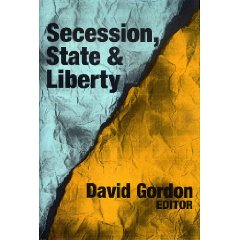
See my reviews of the following for additional background:
Is Secession Treason?
One Nation, Indivisible? A Study of Secession and the Constitution
Constitutional History of Secession
The Vermont Manifesto
Secession: How Vermont and All the Other States Can Save Themselves from the Empire
Blood Money, The Civil War and the Federal Reserve
The Nine Nations of North America
Running on Empty: How the Democratic and Republican Parties Are Bankrupting Our Future and What Americans Can Do About It
Grand Illusion: The Myth of Voter Choice in a Two-Party Tyranny
Ron Paul is on record as stating the government is broken, and I agree. The two-party tyranny and the predatory immoral tyranny of Wall Street and its front, the Federal Reserve (neither Federal nor Reserve) must be abolished, and the sovereignty of the people restored.
It is in the context of the above books that I appreciate this one, edited by David Gordon, so very much.
Despite the urgency and substance of this book, it is not one of those Amazon considers worthy of scanning and providing inside the book, and the publisher has failed to use all the tools that Amazon provides including the ability to upload the table of contents and a free chapter, so below are the contents and a one line appreciation.
0. Introduction (David Gordon). Great overview, snippets on each author's work and its relevance. BOTTOM LINE: Declaration of Independence is the foundation for secession whenever a government “becomes destructive of these ends, it is the right of the people to alter or abolish it.”
1. The Secession Tradition in America (Donald Livingston). Great prefatory stuff on church secessions. Key sentence: “It [Declaration of Independence] is not primarily an argument for individual rights, but rather an argument for the corporate rights of distinct moral and political societies.” Superb itemization of the many falsehoods that Lincoln put forth, and notes that after the war of Independence the British recognized EACH state as its own sovereign state, not the “bundle” of states.
2. When is Political Divorce Justified? (Steven Yates). This chapter hinges on consent of the governed and the right to withdraw when the government either ignores its levitate functions and/or undertakes tasks it should not perform and is not authorized to perform. Anticipates tyranny in the USA, and points out that Lincoln's bloodshed while not quite equal to that of Hitler's or Stalin's, was easily unjustified and clearly associated with an attempt to impose a tyranny on the South that the North had no right to impose.
3. The Ethics of Secession (Scott Boykin). This is a philosophical argument with structure and conclusions, very elegant, concluding that any group that wishes to define itself as a political unit, irrespective of ethnic or other blood issues, is free to do so by natural law.
4. Nations By Consent: Decomposing the Nation-State (Murray Rothbard). Key point here is that nations are not states, and the artificiality of nation-states as imposed by the Treaty of Westphalia (see The Health of Nations: Society and Law beyond the State, is actually a crime against humanity (my interpretation) and therefore all those who are tribes of nations apart from the artificial states have every right to secede, and indeed we have seen just that in Eastern Europe and Central Asia. Africa is next, in my opinion.
5. Secession: The Last, Best Bulwark of Our Liberties (Clyde N. Wilson). Republics have free citizens, Empires have subjects.
6. Republicanism, Federalism, and Secession in the South, 1790 to 1865 (Joseph R. Stromberg). Great history focused on the STATES, each entering into a COMPACT and each RETAINING sovereignty.
7. Yankee Confederates: New England Secession Movements Prior to the War Between the States (Thomas DiLorenzo). New England validated the right first.
8. Was the Union Army's Invasion of the Confederate States a Lawful Act? An Analysis of President Lincoln's Legal Arguments Against Secession (James Ostrowski). Lincoln will lose his luster in time–he confused four separate aspects, and however laudable his intentions, he murdered over 600,000 of his countrymen, destroyed the South, and OCCUPIED the South for 12 years. History will not be kind once history is written by proper Truth & Reconciliation Commissions.
9. The Economic and Political Rationale for European Secessionism (Hana-Hermann Hoppe). This is a deep piece, very current (break-up of USSR) and it touches on the mutual interests of Western empire states and post-communist dictatorships.
10. A Secessonist's View of Quebec's Options (Pierre Desrochers and Eric Duhaine). Since this was written, Canada' Supreme Court has ruled that Quebec has every right to secede any time it wishes.
11. How to Secede in Business Without Really Leaving: Evidence of the Substitution of Arbitration for Litigation (Bruce L. Benson. This one troubles me–the author favors arbitration as a way of avoiding state control, but I for one fear arbitration because it negates the right to a jury trial , and while few know this, juries can not only find one innocent, they can overturn the law within which one is being charged.
Appendices include the Declaration of Independence, the Articles of Confederation, The Constitution of the United States (note that it is the STATES that united), and the Constitution of the Confederate States. The Index is fairly well done, best on proper names, not quite as thorough as I would have liked on secession and slavery and the role of the banks in causing the war.
Overall, a phenomenal book, very timely, and the one book to buy if you get only one (read my reviews of the others, I do summative reviews).




